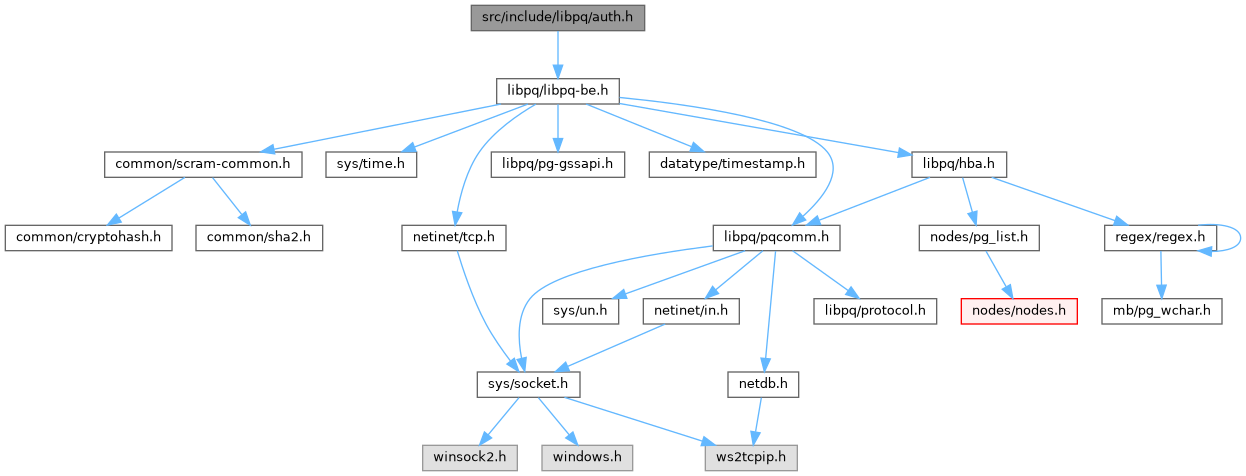#include "libpq/libpq-be.h"

Go to the source code of this file.
Macros | |
| #define | PG_MAX_AUTH_TOKEN_LENGTH 65535 |
Typedefs | |
| typedef void(* | ClientAuthentication_hook_type) (Port *, int) |
| typedef char *(* | auth_password_hook_typ) (char *input) |
Functions | |
| void | ClientAuthentication (Port *port) |
| void | sendAuthRequest (Port *port, AuthRequest areq, const void *extradata, int extralen) |
| void | set_authn_id (Port *port, const char *id) |
Macro Definition Documentation
◆ PG_MAX_AUTH_TOKEN_LENGTH
Typedef Documentation
◆ auth_password_hook_typ
◆ ClientAuthentication_hook_type
Function Documentation
◆ ClientAuthentication()
Definition at line 379 of file auth.c.
References _, am_db_walsender, am_walsender, Assert, auth_failed(), auth_peer(), AUTH_REQ_GSS, AUTH_REQ_OK, AUTH_REQ_SSPI, ClientConnectionInfo::authn_id, CHECK_FOR_INTERRUPTS, CheckPasswordAuth(), CheckPWChallengeAuth(), CheckRADIUSAuth(), CheckSASLAuth(), ClientAuthentication_hook, clientCertFull, clientCertOff, ereport, errcode(), errmsg(), FATAL, fb(), hba_authname(), hba_getauthmethod(), HOSTNAME_LOOKUP_DETAIL, ident_inet(), LOG, LOG_CONNECTION_AUTHENTICATION, log_connections, MemoryContextAllocZero(), MyClientConnectionInfo, pg_be_oauth_mech, pg_getnameinfo_all(), port, secure_loaded_verify_locations(), sendAuthRequest(), STATUS_ERROR, STATUS_OK, TopMemoryContext, uaBSD, uaCert, uaGSS, uaIdent, uaImplicitReject, uaLDAP, uaMD5, uaOAuth, uaPAM, uaPassword, uaPeer, uaRADIUS, uaReject, uaSCRAM, uaSSPI, and uaTrust.
Referenced by PerformAuthentication().
◆ sendAuthRequest()
Definition at line 677 of file auth.c.
References AUTH_REQ_OK, AUTH_REQ_SASL_FIN, buf, CHECK_FOR_INTERRUPTS, fb(), pq_beginmessage(), pq_endmessage(), pq_flush, pq_sendbytes(), pq_sendint32(), and PqMsg_AuthenticationRequest.
Referenced by CheckMD5Auth(), CheckPasswordAuth(), CheckRADIUSAuth(), CheckSASLAuth(), and ClientAuthentication().
◆ set_authn_id()
Definition at line 341 of file auth.c.
References Assert, ClientConnectionInfo::auth_method, ClientConnectionInfo::authn_id, ereport, errdetail_log(), errmsg(), FATAL, hba_authname(), LOG, LOG_CONNECTION_AUTHENTICATION, log_connections, MemoryContextStrdup(), MyClientConnectionInfo, port, and TopMemoryContext.
Referenced by auth_peer(), CheckPasswordAuth(), CheckPWChallengeAuth(), CheckRADIUSAuth(), ident_inet(), and validate().
Variable Documentation
◆ ClientAuthentication_hook
|
extern |
Definition at line 223 of file auth.c.
Referenced by _PG_init(), ClientAuthentication(), and sepgsql_init_client_label().
◆ ldap_password_hook
|
extern |
Referenced by _PG_init().
◆ pg_gss_accept_delegation
|
extern |
Definition at line 175 of file auth.c.
Referenced by secure_open_gssapi().
◆ pg_krb_caseins_users
|
extern |
◆ pg_krb_server_keyfile
|
extern |
Definition at line 173 of file auth.c.
Referenced by secure_open_gssapi().